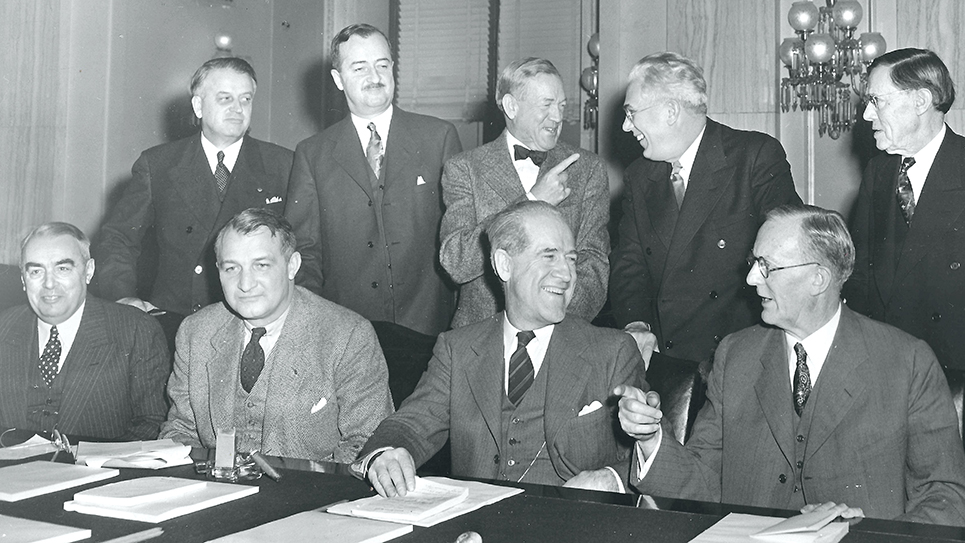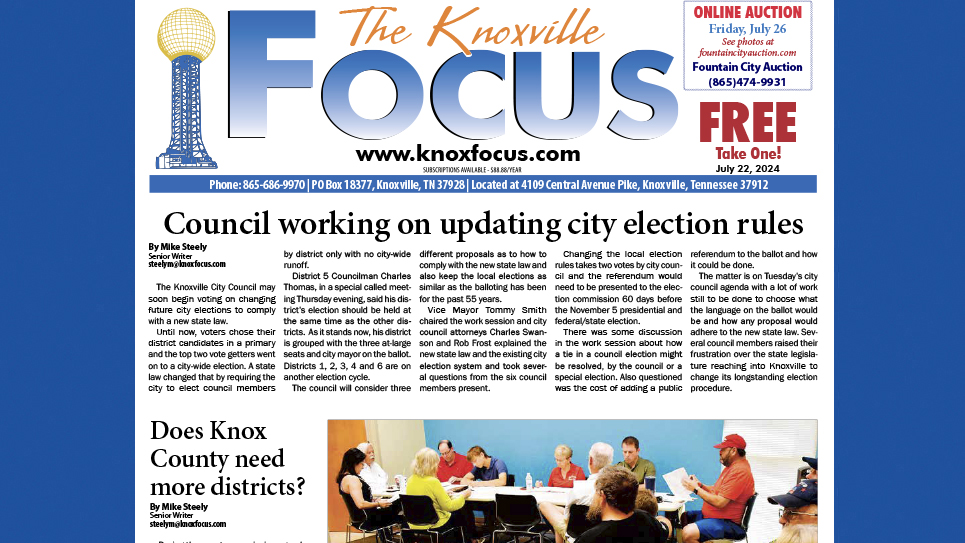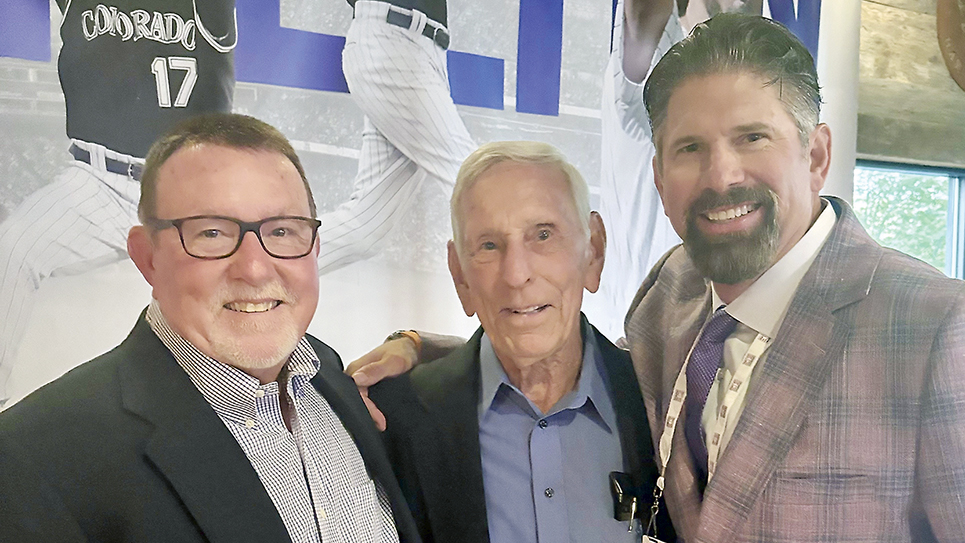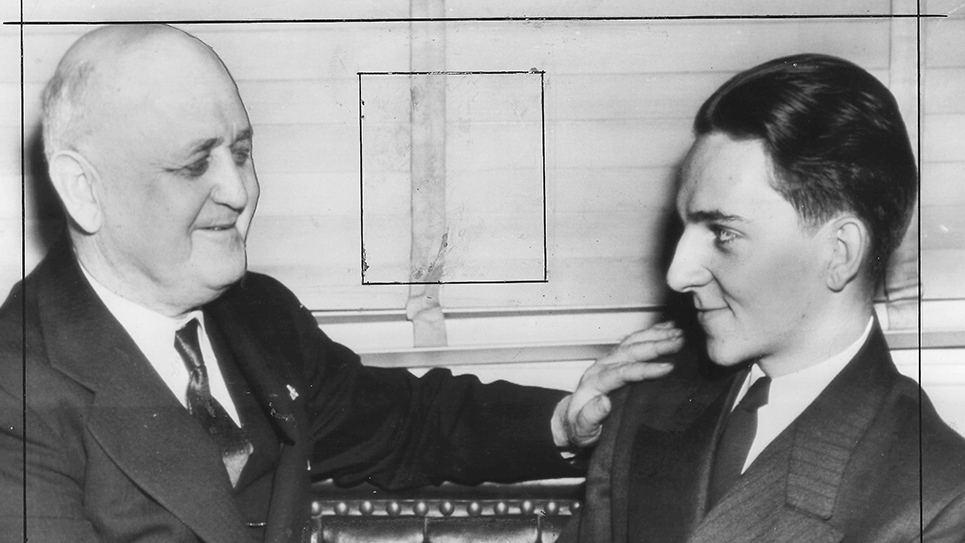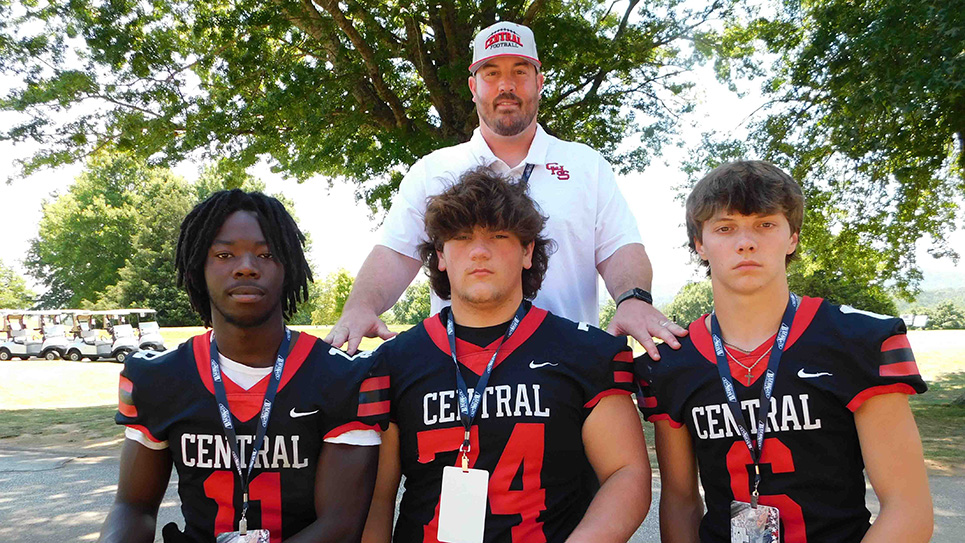Edward H. Moore of Oklahoma
There was a time when Republicans in Oklahoma were pretty scarce in many areas of the state. Yet there were traditionally Republican areas in the Sooner State and during the decade of the 1920s, Oklahoma boasted two GOP United States senators. John W. Harreld had been elected in the 1920 Republican tidal wave and was ousted in 1926 by Congressman Elmer Thomas who remained in the Senate until 1951. William B. Pine, a successful oil man, was first elected to the U.S. Senate in the 1924 election and defeated in 1930 by former Senator Thomas P. Gore, who was blind. Pine was the GOP candidate for governor in 1934 and ran a decent race, but the Great Depression and the drought had hit Oklahoma especially hard hit and the Sooner State was solidly backing Franklin D. Roosevelt and his New Deal.
There is little evidence to prove Edward Hall Moore served six years in the United States. Moore’s papers as a member of the United States Senate seemed to have disappeared as they were never deposited with a college, university or archive. Moore and his wife had no children and if his papers were left to a nephew or niece, God only knows what happened to them. Still, Moore’s life was both colorful and interesting. Ed Moore demonstrated a remarkable knack for making money and his success as a businessman was nothing short of amazing. If a man can truly possess the “Midas touch,” Ed Moore certainly had it. Moore’s life was yet another example of an American success story.
Moore was born in 1871 in Missouri and like so many others of his generation, he taught school as a young man. E. H. Moore had worked his way through college as a janitor. Moore had an affinity for making speeches, but he also enjoyed hearing a good speech. Because he enjoyed oratory, Ed Moore decided to attend law school and graduated from the Kansas City School of Law with a degree in 1900. To get to law school, Moore rode his horse nine miles.
Moore set up a law practice in his native state of Missouri briefly, but moved to Okmulgee, in what was then called the “Indian Territory.” Eventually, E. H. Moore formed a legal partnership with attorney Edgar T. Noble. Moore returned to Missouri in 1905 to marry his sweetheart, Cora McComb.
Moore had a well-deserved reputation for being frugal with his money and his first business ventures centered around investing in real estate. Much of his real estate investments centered around what would eventually become a 10,000-acre ranch where Moore raised cattle. E. H. Moore became bored with his legal practice and branched off to a new business: oil, forming the Independent Oil & Gas Company. Moore was what was known as a wildcat oilman and his first strike in “liquid gold” occurred in the Holmes Field in Okfuskee County, Oklahoma. Moore owned oil properties in Oklahoma, Texas and Kansas. Moore sold his oil business to Phillips Petroleum in 1930. Reputedly, Moore sold his holding for $40 million dollars. That sum is the equivalent of more than $700 million today.
Despite his reputation for being careful with his money, Ed Moore was generous in helping others. E. H. Moore was a member of the congregation of the First Christian Church of Tulsa and it was said no man gave more to churches in Oklahoma. Moore also helped innumerable young men and women by financing their educations.
While being very wealthy, Moore apparently missed the oil business and in 1932 he formed E. H. Moore, Inc. Once again demonstrating his shrewd business acumen and ability to locate oil, Moore had more than 400 successful wells in Oklahoma, Texas, Kansas, and California before he sold that business to his employees in 1941. Two years later, as he entered the United States Senate, Moore sold off his cattle holdings.
Moore had been a Democrat his entire life and his entry in politics was largely accidental. In 1942, former United States Senator William B. Pine was seeking to make a comeback by opposing the Democratic incumbent, Josh Lee. Lee had been elected in 1936 and had won the Democratic primary over several strong candidates. In the general election, Lee had decisively defeated Herbert K. Hyde, who had been Pine’s administrative assistant while Pine had been in the United States Senate. Pine won the GOP nomination for the U.S. Senate but died suddenly, suffering a heart attack at his desk. Oklahoma Republicans quickly sought out E. H. Moore to become the Republican nominee for the U.S. Senate. Moore had become disillusioned by the New Deal, which he criticized sharply. As a delegate to the 1940 Democratic National Convention, he had opposed a third term for Franklin Roosevelt. Moore had outraged Oklahoma Democrats by his rabid support for Wendell Willkie, the GOP presidential nominee in 1940. E. H. Moore became one of the most notable of the Democrats for Willkie organization. Republicans had yet another good reason to offer their nomination to Moore.
Sooner State Republicans believed the millionaire oilman could finance his own campaign in the general election.
TIME magazine quoted Moore stating his philosophy after he had won election to the United States Senate: “I consider money a tool with which to work. It’s a responsibility and I’ve used it to give employment to thousands of men… I want to use my money in my own business to help build my country. That’s my religion.”
When E. H. Moore accepted the GOP nomination for the United States Senate, the Democrats in Oklahoma immediately began hitting the millionaire oilman. Robert S. Kerr, the Democratic nominee for governor, and an oil millionaire himself, criticized Moore for having opposed most of the war program passed by Congress. Kerr said in a speech he imagined E. H. Moore still opposed most of the programs passed by the Congress to prosecute the Second World War. “The same kind of criticism that nominated E. H. Moore also defeated Woodrow Wilson in winning the peace after the first Word War and crucified him,” Kerr cried.
“Can’t you imagine defeating Senator Josh Lee with E. H. Moore?” Bob Kerr asked an audience full of Democrats, who laughed and applauded.
Moore opened his wallet, and he bought impressive ads in Oklahoma newspapers, both large and small. The elaborate ads told Moore’s life story and advertised the candidate as a Democrat and the “Coalition Candidate for U.S. Senate” on the Republican ticket. In his opener in his campaign to win a seat in the U. S. Senate, Moore spoke out bluntly and forcefully. The 71-year-old candidate declared himself an enemy of “all appeasers and compromisers.” Moore denounced the “incompetence, confusion in a time of critical national crisis” in Washington, D.C.
“Our country is approaching bankruptcy because of political bungling,” Moore barked. “We will spend to the limit to preserve our future and win this war. We will overlook and condone mistakes honestly made but we want men with principles and not greed. We want to get rid of demagogues who use this war as a smoke screen as a protection for their nefarious schemes. We want men in the United States Senate who will not be ordered around. We want to preserve our institutions. We have a duty to ourselves and to those who follow us.”
Moore snapped, “We regard sit-down strikers in the same class as soldiers who have turned traitor. Labor racketeers have our national administration by the throat. We will break this stranglehold. We will make labor bosses amenable to the laws of this country.”
When E. H. Moore began his campaign for the U.S. Senate, few political professionals gave the oilman much chance of winning the general election. Moore’s plain talk was considered by most political observers to be too direct for most voters and Moore was getting a late start. Besides, Senator Josh Lee was a formidable incumbent. Joshua Bryan Lee had been named for perhaps the greatest orator of his time and that “incomparable Democrat,” William Jennings Bryan. Lee had actually been a professor of oratory and a good one. When first elected to the United States Senate in 1936, Lee’s campaign had fired the imagination of many young people, including his former students, who were quickly labeled “the Rover Boys” who had widely campaigned for their former professor. Once elected to the Senate, Lee had rewarded many of his “Rover Boys” with plentiful New Deal patronage. Senator Lee was a vocal and avid supporter of Franklin Roosevelt’s New Deal administration.
Oklahoma Democrats reeled from the surprise endorsement of E. H. Moore’s candidacy for the United States Senate by Governor Leon Phillips, a Democrat. Governor Phillips had only given the New Deal superficial support, but once elected in 1938, Phillips had done much to obstruct the Roosevelt administration. Nor did Phillips support the candidacy of Bob Kerr to succeed him as governor, but he did not openly back the GOP gubernatorial nominee. France Paris, chairman of the Oklahoma Democratic Party, denounced Governor Phillips, saying, “He was born a Republican and… is to this day an unreconstructed Republican.”
On Election Day, with a light turnout, E. H. Moore beat Senator Josh Lee by almost ten percentage points, winning with quite nearly 55% of the ballots cast. E. H. Moore became the first Republican to win a seat in the United States Senate in Oklahoma since 1924. Senator Josh Lee was so surprised by his defeat, he did not come out of his hotel room for two days. Republicans barely missed electing their gubernatorial nominee over Robert Kerr and won a seat in the U. S. House of Representatives, but Oklahoma Republicans had underestimated their own strength and either did not nominate strong candidates or failed to field candidates for local offices, losing by default.
Moore immediately surprised many of both parties by originally asking to sit on the Democratic side of the Senate Chamber, but he remained steadfastly loyal to his new political party, as well as his commitment to ending the New Deal. True to his word to Oklahomans, Senator Moore supported legislation to fund and support the war. As a member of the U.S. Senate, E. H. Moore was very much an internationalist while many of his GOP colleagues were still isolationists. Yet Senator Moore never deviated from his opposition to bureaucracy and the New Deal in domestic legislation. Moore stubbornly opposed most pork barrel projects, which at the time, was almost a requirement for senators and congressmen. No hypocrite, Senator E. H. Moore voted against most pork barrel projects for his own state of Oklahoma.
During his time in the United States Senate, E. H. Moore passed no significant legislation, but rather contented himself with casting his vote and staying true to his principles, which he had clearly and unequivocally stated during his campaign.
Many Oklahomans admired Edward H. Moore for his honesty and love for the Sooner State. In 1948, Moore was inducted into Oklahoma’s Hall of Fame as a “statesman and philanthropist.” The 77-year-old senator also announced he would not seek a second term in the U. S. Senate.
When President Harry Truman made his whistle stop tour of Oklahoma, he had harsh words for Senator Moore. Truman praised Governor Bob Kerr who was seeking to replace Ed Moore in the Senate. Truman asked for Oklahomans to vote for Kerr. “We need a man like Bob Kerr to take Old Man Moore’s place. He never was any good in the first place,” Truman growled.
“I know Old Man Moore. I served with him in the Senate for quite a while, and if he did anything for the people it was by accident and not intention,” Truman added.
Of course, the feeling was mutual between Harry Truman and Ed Moore.
Moore retired to his home in Tulsa and lived two more years before dying of a heart attack after having visited his office.
© 2023 Ray Hill

